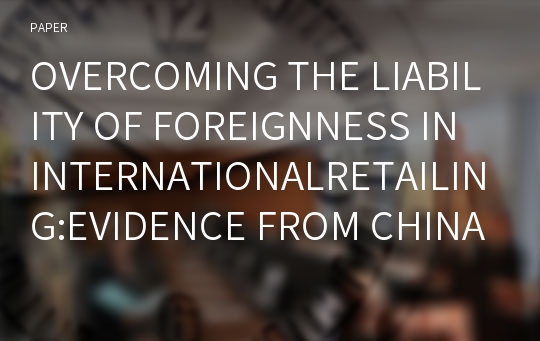OVERCOMING THE LIABILITY OF FOREIGNNESS IN INTERNATIONALRETAILING:EVIDENCE FROM CHINA
* 본 문서는 배포용으로 복사 및 편집이 불가합니다.
서지정보
ㆍ발행기관 : 글로벌지식마케팅경영학회(GFMC)
ㆍ수록지정보 : Global Marketing Conference
ㆍ저자명 : Masayoshi Maruyama, Lihui Wu
ㆍ저자명 : Masayoshi Maruyama, Lihui Wu
영어 초록
Foreign firms often bear additional costs when conducting business abroad (Hymer, 1976), which was later referred to the liability of foreignness (LOF), described as “all additional costs a firm operating in a market overseas incurs that a local firm would not incur” (Zaheer, 1995). This paper proposes a new construct, consumers’ perceived importance of supporting domestic retailers (PISD), which expresses consumers’ willingness or desire to support domestic firms. We first examine whether PISD represents a kind of LOF; if yes, we investigate what kind, if any, firm-specific advantages of foreign firms can overcome this discrimination by consumers. We found that PISD is a kind of LOF, which has a negative effect on consumers’ choice of foreign retailers. Value-for-money factors rather than doing CSR would moderate this effect. This study adds to the literature of LOF in three ways. First, to the best of our knowledge, this is the first study that attempts to examine LOF within an international retailing context. Second, we provide empirical evidence regarding the effect of PISD on consumers’ actual store patronage behavior. In comparison to many previous studies that adopted firm-level data, focusing on consumers’ behavior will provide a fine-grained perspective of the functioning of the LOF, and help open the ‘black box’ of it. Third, we propose a possible way of overcoming the discrimination hazard of LOF in Chinese market. A key proposition of the institutional theory is that within a given socially constructed value or belief system, a firm will seek ‘legitimacy’ in order to gain the support of social actors (Suchman, 1995). The process of legitimation is complex especially for foreign firms as they often face the challenge of establishing and maintaining legitimacy in the host environments Kostova & Zaheer, 1999). Social actors such as consumers in the host countries tend to perceive foreign firms lack of legitimacy due to their foreign identity, which result in consumers’ bias. In relation to this, Shimp & Sharma (1987) developed the concept of consumer ethnocentrism (CE), referring to “consumers’ beliefs about the appropriateness and morality of purchasing foreign products”. This consumer bias, measured by CETSCALE, is proved to have a negative effect on consumers’ behavior towards foreign products, and thus can be regarded as a kind of discrimination hazard that foreign firms have to face. In this study, we suggest an extension of Shimp & Sharma’s (1987) idea and an empirical test of the effect of a similar construct on consumer behavior. The construct is defined as the perceived importance of supporting domestic retailers (PISD). PISD is similar to Foreign firms often bear additional costs when conducting business abroad (Hymer, 1976), which was later referred to the liability of foreignness (LOF), described as “all additional costs a firm operating in a market overseas incurs that a local firm would not incur” (Zaheer, 1995). This paper proposes a new construct, consumers’ perceived importance of supporting domestic retailers (PISD), which expresses consumers’ willingness or desire to support domestic firms. We first examine whether PISD represents a kind of LOF; if yes, we investigate what kind, if any, firm-specific advantages of foreign firms can overcome this discrimination by consumers. We found that PISD is a kind of LOF, which has a negative effect on consumers’ choice of foreign retailers. Value-for-money factors rather than doing CSR would moderate this effect. This study adds to the literature of LOF in three ways. First, to the best of our knowledge, this is the first study that attempts to examine LOF within an international retailing context. Second, we provide empirical evidence regarding the effect of PISD on consumers’ actual store patronage behavior. In comparison to many previous studies that adopted firm-level data, focusing on consumers’ behavior will provide a fine-grained perspective of the functioning of the LOF, and help open the ‘black box’ of it. Third, we propose a possible way of overcoming the discrimination hazard of LOF in Chinese market. A key proposition of the institutional theory is that within a given socially constructed value or belief system, a firm will seek ‘legitimacy’ in order to gain the support of social actors (Suchman, 1995). The process of legitimation is complex especially for foreign firms as they often face the challenge of establishing and maintaining legitimacy in the host environments(Kostova & Zaheer, 1999). Social actors such as consumers in the host countries tend to perceive foreign firms lack of legitimacy due to their foreign identity, which result in consumers’ bias. In relation to this, Shimp & Sharma (1987) developed the concept of consumer ethnocentrism (CE), referring to “consumers’ beliefs about the appropriateness and morality of purchasing foreign products”. This consumer bias, measured by CETSCALE, is proved to have a negative effect on consumers’ behavior towards foreign products, and thus can be regarded as a kind of discrimination hazard that foreign firms have to face. In this study, we suggest an extension of Shimp & Sharma’s (1987) idea and an empirical test of the effect of a similar construct on consumer behavior. The construct is defined as the perceived importance of supporting domestic retailers (PISD). PISD is similar to the concept of “involvement”, which is defined as the individual’s perceived importance of the product or the act, just as PISD is defined in this study. The similarity of the PISD with the concept of involvement provides support for the necessity of examining the effect of PISD on consumers’ shopping behavior. The definition of PISD differs from CE in that CETSCALE has been weighted heavily toward consumers’ beliefs about buying foreign products for national people, whereas PISD is an individual-specific construct. For example, many items of the scale that measures CE (see Shimp & Sharma, 1987 for detail,) are designed as “American people should always…”; “We should purchase…” ; In contrast, PISD leans more heavily on individual desire or willingness to support domestic retailers. To put it simply, even if an individual strongly agrees that it is not right for locals to purchase foreign products or visit foreign retail stores, it may not influence his or her actual store choice behavior, when no desire or willingness to support domestic retailers exists. Therefore, PISD, indicative of a desire or willingness to support domestic retailers, is an individual-level construct that is believed to be a better predictor of those decisions. The theories of foreign direct investments (FDI) deal with the questions, why MNEs or FDI exist and why they invest abroad. One of the theories is the specific-advantage hypothesis, which argued that the existence of MNEs hinges on the nature of the specific advantage of the firm, which would compensate for the disadvantages faced by foreign firms (Dunning, 2000). In international retailing, the advantages of foreign retailers in transitional economy are usually related to retail mix such as the uniqueness of products, merchandise assortment, and competitive pricing. Furthermore, Luo, Shenkar, & Nyaw (2002) suggest that foreign firms might be able to improve their moral legitimacy by ‘doing good’ through CSR activities. In this study, we test about whether foreign retailers can overcome the LOF of PISD by retail mix advantages or doing CSR activities. Data in this study were collected by means of a self-administrated survey in Dalian city of China. The survey was conducted in four urban districts of Dalian during November 9–30, 2011. In the process of data collection, sub-district units (residential streets) in each district were identified, of which 5–10 streets were selected. From these, 3–5 communities were selected, and households were selected from each community by simple random sampling. The person responsible for most of the household shopping was asked to answer the questions. A total of 590 respondents participated in the survey, of which 90 samples were excluded due to incomplete responses, and so we were left with a final sample of 500. Respondents were between 20 and 65 years old; those between 20 and 29 accounted for 29.8% of the sample; 31.4% were between 30 and 39; respondents between 40 and 49 accounted for 17.0%; and 21.8% were over 50. Respondents earning a monthly income of 2,000–8,000 RMB (Chinese yuan), 8,000–10,000RMB, and more than 10,000RMB accounted for 62%, 15%, and 11.8% of the sample, respectively.Regarding the measures of retail mix, we included a list of store attributes based on the list provided in studies such as Lindquist (1974-75) and Pan & Zinkhan (2006). All the items were measured on a scale from 1 to 5, anchored by “not important at all” to “very important.” Factor analysis was first utilized to investigate the structure impact on foreign retailers will be weaker for consumers who attach more importance to quality and promotion. Therefore, we argue that it would be more effective for foreign retailers to emphasize value-for-money retail mix elements in order to mitigate or overcome the LOF of PISD. CSR was positively significant in both Model 1 and Model 2, implying that consumers who attach more importance to CSR are more likely to shop at foreign retail stores. However, the interaction effects between CSR and PISD were insignificant. This indicates that for consumers with higher level of PISD, the importance attached to CSR will not weaken the negative effect of PISD. These results imply that, in a general sense, foreign firms’ effort on CSR performance is rewarded by those consumers who attach more value on CSR. However, for those who have higher level of PISD, foreign firms do not seem to be able to gain their support just by doing ‘good deeds’ (CSR).참고 자료
없음"Global Marketing Conference"의 다른 논문
 THE ROLES OF GREEN PACKAGING IN UGLY FOOD PURCHASE INTE..22페이지
THE ROLES OF GREEN PACKAGING IN UGLY FOOD PURCHASE INTE..22페이지 THE IMPACT OF INDUCED AWE ON ETHICAL TOURIST BEHAVIORS5페이지
THE IMPACT OF INDUCED AWE ON ETHICAL TOURIST BEHAVIORS5페이지 A BIBLIOMETRIC ANALYSIS OF SPIRITUAL TOURISM RESEARCH15페이지
A BIBLIOMETRIC ANALYSIS OF SPIRITUAL TOURISM RESEARCH15페이지 SOCIAL NETWORK ANALYSIS AND RESPONSE TIME TESTING: CONS..11페이지
SOCIAL NETWORK ANALYSIS AND RESPONSE TIME TESTING: CONS..11페이지 THE EFFECTS OF PARA-SOCIAL INTERACTION ON ONLINE CELEBR..3페이지
THE EFFECTS OF PARA-SOCIAL INTERACTION ON ONLINE CELEBR..3페이지 THE INFLUENCE OF OPINION LEADERS ON DAILY DEALS USER’S ..3페이지
THE INFLUENCE OF OPINION LEADERS ON DAILY DEALS USER’S ..3페이지 HOW IMMERSIVE RETAILING AFFECTS CONSUMERS’ URGE TO BUY:..6페이지
HOW IMMERSIVE RETAILING AFFECTS CONSUMERS’ URGE TO BUY:..6페이지 KEY TO SUPERSTARDOM IN A GLOBALISED MARKET: THE ROLE OF..6페이지
KEY TO SUPERSTARDOM IN A GLOBALISED MARKET: THE ROLE OF..6페이지 A POST-PANDEMIC LOOK AT TOURISTS’ PERCEIVED COOLNESS OF..4페이지
A POST-PANDEMIC LOOK AT TOURISTS’ PERCEIVED COOLNESS OF..4페이지 EXTRACTING OFFLINE RETAIL SHOPPING PATTERNS: OLLABORATI..5페이지
EXTRACTING OFFLINE RETAIL SHOPPING PATTERNS: OLLABORATI..5페이지

























